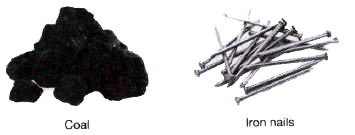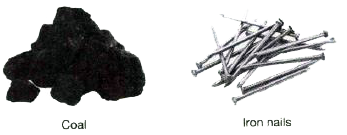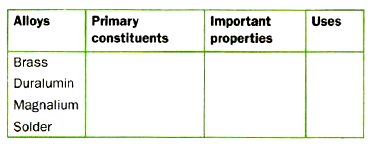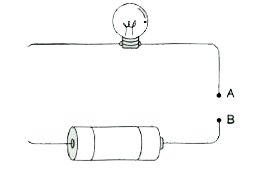Complete Solutions to CLASSROOM CORNER (LONG ANSWER TYPE QUESTION) of chapter METALS AND NON-METALS of Class 8 book with complete answers and questions
| Class 8 | CHEMISTRY |
| Chapter | METALS AND NON-METALS |
| PEARSON IIT JEE FOUNDATION | CLASSROOM CORNER (LONG ANSWER TYPE QUESTION) |
| Number Of Questions | 18 |
| Academic Year | 2023-24 |
Look at the pictures given below and answer the following question.

Write what these objects are made up of.
View SolutionLook at the pictures given below and answer the following question.

Write the differences between the materials used in the above two images.
View SolutionWrite a balanced chemical equation to show the chemical reaction that would take place
View SolutionWhat would happen if blue and red litmus papers used to test the product of this reaction? Why?
View SolutionWould the reaction of potassium with water be more or less vigorous as compared to this reaction? Given a reason to support your answer
View SolutionGraphite is a non-metal that is similar to metals in many ways. Give few reasons to support this statement.
View SolutionState five uses of metals and five of non-metals.
View SolutionList the main properties and uses of the alloys given in the table below.

View SolutionGiven reasons for the following.
Non-metals are not used for making utensils and electrical wires.
View SolutionGiven reasons for each of the following.
Sulphur is used in skin ointments.
View SolutionGiven reasons for each of the following.
Phosphorus is stored inside water.
View SolutionGiven reasons for each of the following.
Iron can displace copper from copper sulphate solution, but copper cannot displace iron from iron sulphate.
View SolutionDisplacement reaction is a reaction in which a less reactive metal is displaced from its salt by a more reactive metal. From the reactivity series, we can find that metals higher up in the series are more reactive than metals present lower in the series.
Write Yes or No For each of the following situations to show whether a displacement reaction can take place or not.
(a). Reaction between zinc sulphate and iron.___________
(b). Reaction between iron oxide and aluminium._________
(c). Reaction between silver nitrate and copper. __________
(d). Reaction between aluminium phosphate and nickel___________
View SolutionIn the table given below, Summarize the difference between metals and non-metals,on the basis of their two physical and chemical properties.

View SolutionMake a simple electirc circuit using three copper wires, a bulb and a battery as shown in the figure given alongside. Now, collect the following items-an iron nail, a copper key, a strip of aluminium foil and a piece of coal. Place each of the collected items, one by one, between the points A and B such that the circuit is closed. Read the questions below and try to answer them

What do you understand from this activity?
View SolutionUsing a pair of tongs, hold a piece of magnesium ribbon over a flame and heat it until the ribbon catches fire.Carefully, collect the white ash obtained from the burnt ribbon in a china dish. Dissolve a little bit of this ash in a test tube containing water. Read the following questions and try to answer them
(a). Test this solution with read and blue litmus papers. What do you observe?
(b). What can you conclude about the reaction of metals with oxygen from this experiment?
View SolutionTake a small quantity of sulphur in a deflagrating spoon and heat it over the flame of a Bunsen burner. As soon as the sulphur catches fire, lower the spoon into a gas jar and close it with a lid. Wait until the sulphur stops burning.
Once the sulphur stops burning, take the spoon out of the jar. Now, pour a small amount of water into the jar and quickly close the lid again. Shake the jar well so that the gas formed in the jar dissolves in the water.
(a). Test this solution formed in the jar with red and blue litmus papers. What do you observe?
(b). What can you conclude about the reaction of non-metals with oxygen from this experiment?
View SolutionFind out about ores of different metals that are found in India and the parts of our country they are found in.
View Solution
CLASSROOM CORNER (LONG ANSWER TYPE QUESTION) questions and complete solutions for chapter METALS AND NON-METALS of PEARSON IIT JEE FOUNDATION of Class 8
All Exercises from PEARSON IIT JEE FOUNDATION Class 8 CHEMISTRY METALS AND NON-METALS
- CLASSROOM CORNER ( ASSERTION - REASON TYPE QUESTIONS)
- CLASSROOM CORNER ( COMPREHENSION - BASED QUESTIONS)
- CLASSROOM CORNER ( MULTIPLE CHOICE QUESTIONS)
- CLASSROOM CORNER ( SUBJECTIVE TYPE QUESTIONS)
- CLASSROOM CORNER (LONG ANSWER TYPE QUESTION)
- CLASSROOM CORNER (SHORT ANSWER TYPE QUESTION)
- COMPETITION CORNER
- HOTS- HIGHER ORDER THINKING SKILLS
- MASTER YOUR TEST (SOLVED EXAMPLE)
- TRACK YOUR LEARNING - I
- TRACK YOUR LEARNING - II
- TRACK YOUR LEARNING - III
- TRACK YOUR LEARNING - IV
- TRACK YOUR LEARNING - V